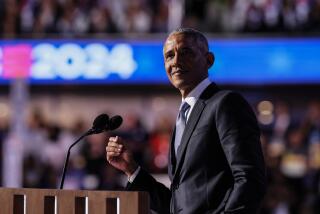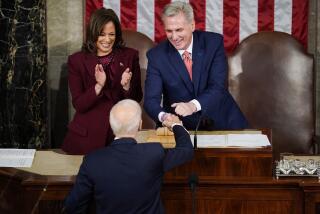Obama’s message to supporters who want more from him: I’m making progress
- Share via
Reporting from Washington — As much as President Obama has battled Republicans and even fellow Democrats during his administration, he’s faced an equally difficult opponent during his six-plus years in the White House: the expectations that he would fulfill the sweeping promise of change of his 2008 campaign.
Despite the frustration of disappointed supporters, the president argued in a new interview that what he has done will leave the country on a better path.
“The trajectory of progress always happens in fits and starts,” Obama told comedian Marc Maron on his “WTF” podcast that was released Monday. “I can say that in terms of not just managing the government but moving the country forward, we’ve had a lot more hits than misses. And we’ve made a difference in people’s lives.”
That’s true on several issues, he argued, including the economy, climate change and education. And more broadly, he said, it’s the story of America, particularly as it relates to racism.
In a portion of the interview that attracted immediate attention, the president said that it was “incontrovertible” that race relations had improved in the country during his lifetime, but that the U.S. still has not been “cured” of racism.
“It’s not just a matter of it not being polite to say ‘nigger’ in public. That’s not the measure of whether racism still exists or not,” he said. “Societies don’t overnight completely erase everything that happened 2[00] to 300 years prior.”
A White House spokesman said Monday that the president did not use the racial epithet to be intentionally provocative but that he said it simply during what was a “a free-flowing conversation.”
The more than hourlong interview, recorded Friday in the garage of Maron’s Highland Park home, came less than a day after Obama renewed his call for stricter gun control in the wake of the mass shooting at a South Carolina church that left nine people dead. The suspect, who is white, had posted a racist manifesto online that was discovered over the weekend.
In response not only to the Charleston shooting but also to violent clashes between law enforcement and minorities that have riven the U.S. in recent months, Obama said the nation needs a broader sense “that what happens to those kids matters to me even if I never meet them.”
He said that a number of things, including such policy decisions as reforming police practices and making early childhood education more widely available, can help people recognize that “my society’s going to be better off, I’m going to feel better about the America I live in, and over time I’m confident that my children and my grandchildren are going to live a better life if those kids also have opportunity.”
The interview offered the president an informal opportunity to expand his views on the difficulty of reconciling his own aspirations and deeply held ideology with applying them to real-world situations.
Obama said that the “Hope” and “Change” posters so prevalent in his 2008 historic campaign to be the nation’s first black president captured Americans’ aspirations about where the country should be, but that the challenge for him was always going to be how to turn “those abstract concepts into something really concrete.”
“As soon as you start talking about specifics, then the world’s complicated,” Obama said. “You’ve got these big legacy systems that you have to wrestle with, and you have to balance what you want and where you’re going with what is and what has been.”
At this late point in his presidency, Obama said, he’s having many conversations with supporters who wonder why he couldn’t do more on one issue or another.
“What I have to explain to them is progress in a democracy is never instantaneous, and it’s always partial. And you can’t get cynical or frustrated because you didn’t get all the way there immediately,” he said.
On healthcare, for instance, it was never going to be possible to replace a healthcare system with public and private insurance markets with one where the government pays for care, which led him to pursue the Affordable Care Act.
“Five years later, we’ve got millions of people who have healthcare that didn’t have healthcare before. We’ve got the lowest uninsured rate that has ever been reported,” he said. “For a lot of people they’re looking at it and saying, ‘Well we didn’t get everything we wanted.’ For me what I say to myself is, for those millions of people — many of whom write to me and say you saved my life — that’s democracy working. That’s government working.”
In the end, Obama agreed with Maron’s contention that in some respects the presidency is no more than a middle management position.
“Sometimes your job is just to make stuff work,” Obama said. “Sometimes the task of government is to make incremental improvements or try to steer the ocean liner 2 degrees north or south so that 10 years from now, suddenly we’re in a very different place than we were. At the moment, people may feel like we need a 50-degree turn, we don’t need a 2-degree turn. And you say, ‘Well, if I turn 50 degrees, the whole ship turns” over.
Arguably no president has had to govern in more hyperactive times, with the 24-7 news environment his predecessors criticized replaced by an even more instantaneous social media age. Obama also lamented what he said was a growing gap between “who we are as a people and how our politics expresses itself,” and how various factors have led some to grow more cynical about the process. That’s one reason the president made the unconventional choice to sit for an interview in a venue like Maron’s.
“Increasingly I’ve spent my time thinking about how do I try to break out of these old patterns that our politics has fallen into. Which is part of the reason why I’m here,” Obama said.
The president said that in part because of his famously cool temperament — inspired by his upbringing in Hawaii — he has managed to block out voices demanding more immediate actions.
“Look, are there frustrations in my job? Yes,” he said. But if he is judged by President Reagan’s question of whether you were better off now than you were four years ago, Obama said the answer was unequivocally yes.
“That is ultimately what you’re looking for, when you wake up every day you say to yourself, ‘Are things a little bit better?’” he said. “And if you take that long view, then you’re less nervous or stressed about the day-to-day ups and downs.”
For more White House coverage, follow @mikememoli
ALSO:
Black Americans grapple with unease in wake of Charleston shooting
Hillary Clinton: ‘America’s long struggle with race is far from finished’
Judge in Charleston shooting case previously reprimanded for racial slur
More to Read
Sign up for Essential California
The most important California stories and recommendations in your inbox every morning.
You may occasionally receive promotional content from the Los Angeles Times.














